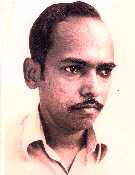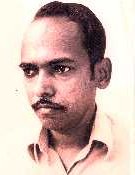
Home | Biodata | Biography | Photo Gallery | Publications | Tributes
Mourning the loss

 |
Home | Biodata | Biography | Photo Gallery | Publications | Tributes Mourning the loss |
 |
Tribute to a dear Friend
Dear friends, especially dear Rani, Arul and Anna:
How do we bid farewell, so suddenly and abruptly, to some one whom we knew as full of life and mirth, some one who lived among us as a scholar and teacher, some one whom we loved and who loved us and cared for us? And yet so is life; we are here today and gone tomorrow. "Man's days are like grass; he blossoms like the flowers of the field: a wind passes over them, and they cease to be, and their place knows them no more". Here is some one who did blossom like a flower, with its fragrance made known in many spheres of life, and has now departed from us.
In this kind of transient life, it has been one of my greatest privileges and blessings that I had the opportunity to get to know Gift Siromoney and to enjoy his friendship over the past four decades. He and I came to this College in June 1950 for the Honours course, he in Mathematics and I in Economics. We lived in this Hall, and were together in the mess, in the reading room and indoor games room, in this chapel, its sanctuary guild and choir
 chanting together the Nunc Dimittis, "Lord, now lettest thou thy servant depart in peace…" the lines, we are told, he kept constantly repeating in the past few weeks. Gift was the salt and pepper of life in the Hall, his many puckish pranks relieving sometimes the monotony and sometimes the tensions of Hall life. Later, we were both invited to join the faculty of the College, and we worked together on many aspects of life and work in the College, first as young lecturers, then as Professors and Heads of Departments. We also shared many common academic interests and social concerns, and I would like to acknowledge publicly the immense help I received from him in my research work, both when I was in the College and even after I left it.
chanting together the Nunc Dimittis, "Lord, now lettest thou thy servant depart in peace…" the lines, we are told, he kept constantly repeating in the past few weeks. Gift was the salt and pepper of life in the Hall, his many puckish pranks relieving sometimes the monotony and sometimes the tensions of Hall life. Later, we were both invited to join the faculty of the College, and we worked together on many aspects of life and work in the College, first as young lecturers, then as Professors and Heads of Departments. We also shared many common academic interests and social concerns, and I would like to acknowledge publicly the immense help I received from him in my research work, both when I was in the College and even after I left it.
Everybody here knows that Gift received national and international recognition in his own field, Statistics. But he was no narrow specialist
 there was virtually no area of life that failed to attract his attention. He had the rare ability to be fascinated by anything that he came across
there was virtually no area of life that failed to attract his attention. He had the rare ability to be fascinated by anything that he came across
 stones and tools, butterflies and birds, inscriptions and ornaments, designs and architecture, painting and photography, music and literature. I would like to suggest to the younger people here that they should go through the back numbers of the College Magazine, where he had made it a point to make a contribution practically every issue, to get an idea of the amazing versatility of Gift Siromoney. There was a fullness of life in him that made him a vibrant and warm person.
stones and tools, butterflies and birds, inscriptions and ornaments, designs and architecture, painting and photography, music and literature. I would like to suggest to the younger people here that they should go through the back numbers of the College Magazine, where he had made it a point to make a contribution practically every issue, to get an idea of the amazing versatility of Gift Siromoney. There was a fullness of life in him that made him a vibrant and warm person.
His natural curiosity was accompanied by tremendous enthusiasm  an infectious kind of enthusiasm that flowed out as encouragement to generations of students in his Department, and to a wide circle of colleagues and friends in the College, in the State, throughout the country and in many foreign lands. I recall how in the tense and uncertain days of the anti-Hindi agitation in this State when the College had to be closed for an indefinite period, he organized tabla lessons for many of us. He and I started together as novices. He went on to graduate and later perform in this chapel, while I became a drop out, as I have in many
other spheres of life. Perhaps this was one of the rare instances where his enthusiasm failed to catch on, but through no fault of his.
an infectious kind of enthusiasm that flowed out as encouragement to generations of students in his Department, and to a wide circle of colleagues and friends in the College, in the State, throughout the country and in many foreign lands. I recall how in the tense and uncertain days of the anti-Hindi agitation in this State when the College had to be closed for an indefinite period, he organized tabla lessons for many of us. He and I started together as novices. He went on to graduate and later perform in this chapel, while I became a drop out, as I have in many
other spheres of life. Perhaps this was one of the rare instances where his enthusiasm failed to catch on, but through no fault of his.
Why was
such a vivacious person taken away from us so abruptly? We shall never know, for death is a mystery. We are here today, and are gone tomorrow
 every one of us. I am coming to realize that the distance between life and death is but a split second. But then, the real mystery is not death, but life itself. Death becomes a mystery only because it is a part of life, an intimate and unavoidable part. If we cannot explain why our dear friend has left us, I cannot think of any special reason why the rest of us are alive, either.
every one of us. I am coming to realize that the distance between life and death is but a split second. But then, the real mystery is not death, but life itself. Death becomes a mystery only because it is a part of life, an intimate and unavoidable part. If we cannot explain why our dear friend has left us, I cannot think of any special reason why the rest of us are alive, either.
Dear friends, the real issue is not when life here on earth is going to end for any one of us; for sure it will happen one day or the other. The issue then is what we make of our lives here, and what we hope for, beyond the changes and chances of this fleeting world. Death is not a full stop that comes at the end of life. It is a
comma, perhaps a semi-colon to pause and to ponder. The death of a dear one, in particular, is an opportunity for us to ponder over the meaning and purpose of life
 life here and life hereafter. It is an opportunity for us to ponder over the mysterious deeds of the author and sustainer of life, who always renews our lives in ways that we do not sometimes understand. In that kind of reflection we will be able to know a little better what death is, and prepare ourselves to come to terms with it.
life here and life hereafter. It is an opportunity for us to ponder over the mysterious deeds of the author and sustainer of life, who always renews our lives in ways that we do not sometimes understand. In that kind of reflection we will be able to know a little better what death is, and prepare ourselves to come to terms with it.
I believe whether he had talked about it or not, Gift had come to terms with death not just in the past few weeks while he was frequently chanting the Nunc Dimittis. I recall vividly the telegram he sent me when my father passed away ten years ago. It was the first line of the first hymn we sang a little while ago; "The strife is over, the battle done, Alleluia!" What a meaningful way to think about death! I have no doubt that this would have been the way he thought about his death also. Those who have seriously thought through the meaning and mission of their lives would be able to face death, when it comes with a triumphant "Halleluiah".
If, then, this is the way Gift had come to terms with his departure from this world, shouldn't we also say in the same spirit: " Why are you cast down, O my soul, and why are you disquieted within me? Hope in God, for I shall again praise him, my help and my God".
With such assurance and hope, dear friend, beloved brother, we bid you farewell, until we meet again.
Kurien C.T. (Fellow Student and Colleague 1950-78)
Formerly: Director
Currently: Prof. Emeritus, Madras Institute of Development Studies (MIDS).Chennai.